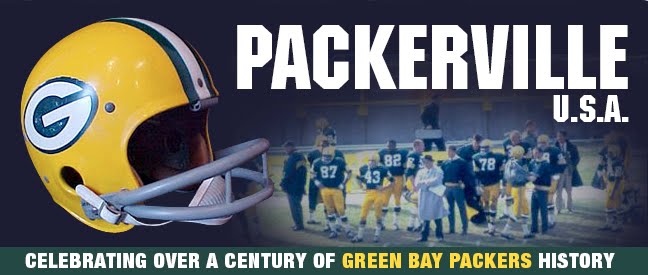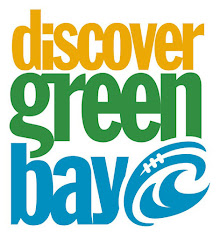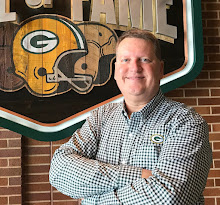
For today’s Blog posting, we thought we’d follow up last Sunday’s victory over the Kansas City Chiefs with an image from a more important victory — Super Bowl I. The Packers defeated Kansas City 35-10 in that game.
After both teams traded punts on their first possessions of the game, the Packers jumped out to an early 7-0 lead, driving 80 yards in six plays. On the last play, Bart Starr threw a pass to reserve receiver Max McGee, who had replaced injured started Boyd Dowler earlier in the drive. McGee slipped past Chiefs cornerback Willie Mitchell, made a one-handed catch at the 23-yard line, and then took off for a 37-yard touchdown reception. On their ensuing drive, the Chiefs moved the ball to Green Bay's 33-yard line, but kicker Mike Mercer missed a 40-yard field goal.
Early in the second quarter, Kansas City marched 66 yards in six plays, featuring a 31-yard reception by receiver Otis Taylor, to tie the game on a 7-yard pass to Curtis McClinton from quarterback Len Dawson. But the Packers responded on their next drive, advancing 73 yards down the field and scoring on fullback Jim Taylor's 14-yard touchdown run with the team's famed "Power Sweep" play. With a minute left in the half, Mercer kicked a 31-yard field goal to cut the lead to 14-10.
At halftime, it appeared that the Chiefs had a chance to win. Many people watching the game were surprised how close the score was and how well the AFL's champions were playing. Kansas City actually outgained the Packers in total yards, 181-164, and had 11 first downs compared to the Packers' nine. The Chiefs were exuberant at halftime. Hank Stram said later "I honestly thought we would come back and win it." The Packers were disappointed with the quality of their play in the first half. "The coach was concerned" said defensive end Willie Davis later. Lombardi told them the game plan was sound but that they had to tweak some things and execute better.
On their first drive of the second half, the Chiefs advanced to their own 49-yard line. But on a third down pass play, a heavy blitz by linebackers Dave Robinson and Lee Roy Caffey rushed Dawson's throw, and the ball was intercepted by Willie Wood, who then returned it 50 yards to Kansas City's 5-yard line ("the biggest play of the game," wrote Starr later). On their first play after the turnover, running back Elijah Pitts rushed five yards and gave the Packers another touchdown in a 21-10 blowout to that point.
The Packers defense would then dominate the Chiefs offense for the rest of the game, only allowing them to cross midfield once, and for just one play. The Chiefs were forced to deviate from their game plan, and that hurt them. The Chiefs' offense totaled 12 yards in the third quarter, and Dawson was held to 5 out of 12 second half pass completions for 59 yards.
Meanwhile, Green Bay forced Kansas City to punt from their own 2-yard line after sacking Dawson twice and got the ball back with good field position on their own 44. McGee subsequenlty caught 3 passes for 40 yards on a 56-yard drive that ended with his 13-yard touchdown reception.
Midway through the fourth quarter, Starr completed a 25-yard pass to Carroll Dale and a 37-yard strike to McGee, moving the ball to the Chiefs 18-yard line. Four plays later, Pitts scored his second touchdown on a 1-yard run to close out the scoring, giving the Packers the 35-10 win. Also in the fourth quarter, Fred Williamson, who had boasted about his "hammer" prior to the game, was knocked out when his head collided with running back Donny Anderson's knee, and then suffered a broken arm when Chiefs linebacker Sherrill Headrick fell on him. Williamson had three tackles for the game.
Although Starr was named MVP, much of the Packers' success during the game can be attributed to McGee. During the regular season, McGee had only caught a total of four passes for 98 yards and one touchdown, but he ended up recording seven receptions for 138 yards and two touchdowns in the Super Bowl. Paul Hornung was the only Packer not to see any action. Lombardi had asked him in the fourth quarter if he wanted to go in, but Horning declined, not wanting to aggravate a pinched nerve in his neck.
The Green Bay Packers were each paid a salary of $15,000 as the winning team. The Chiefs were paid $7,500 each.



























